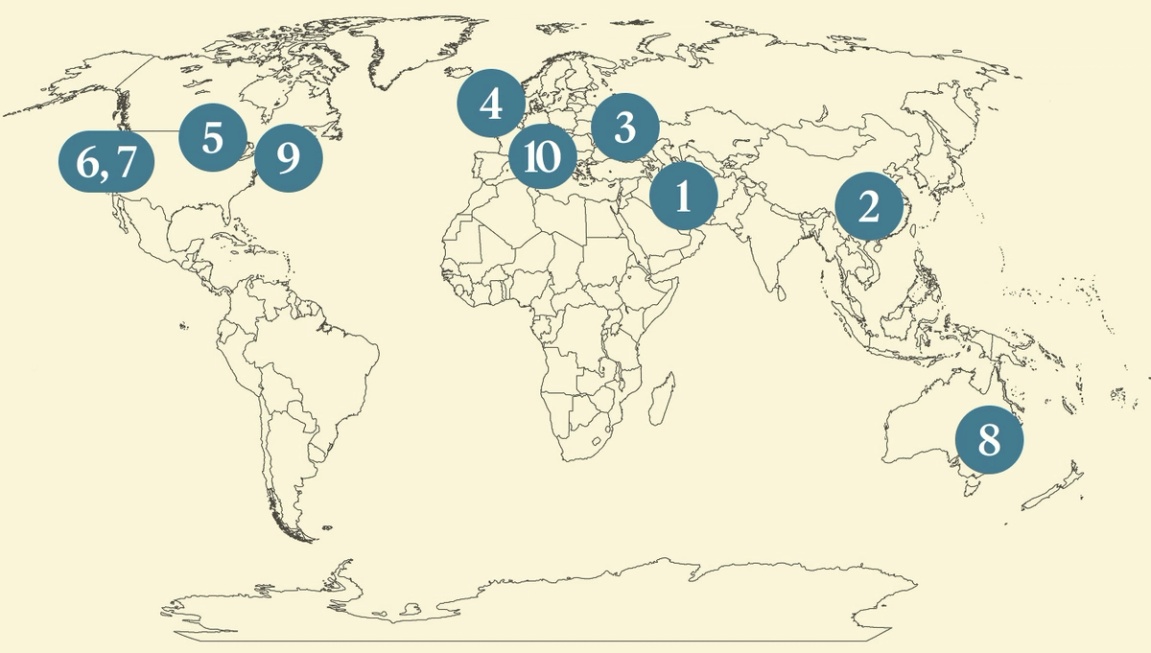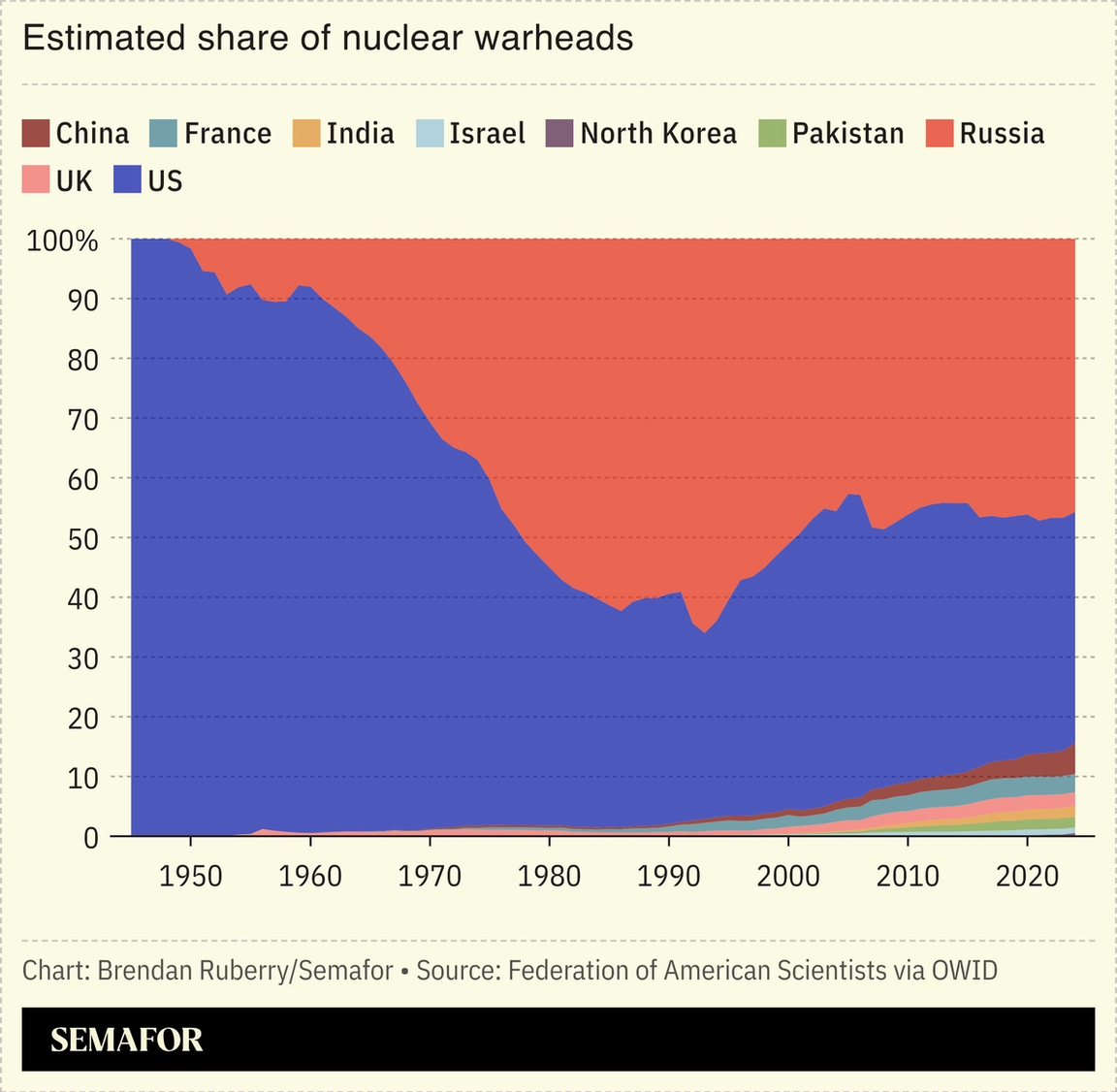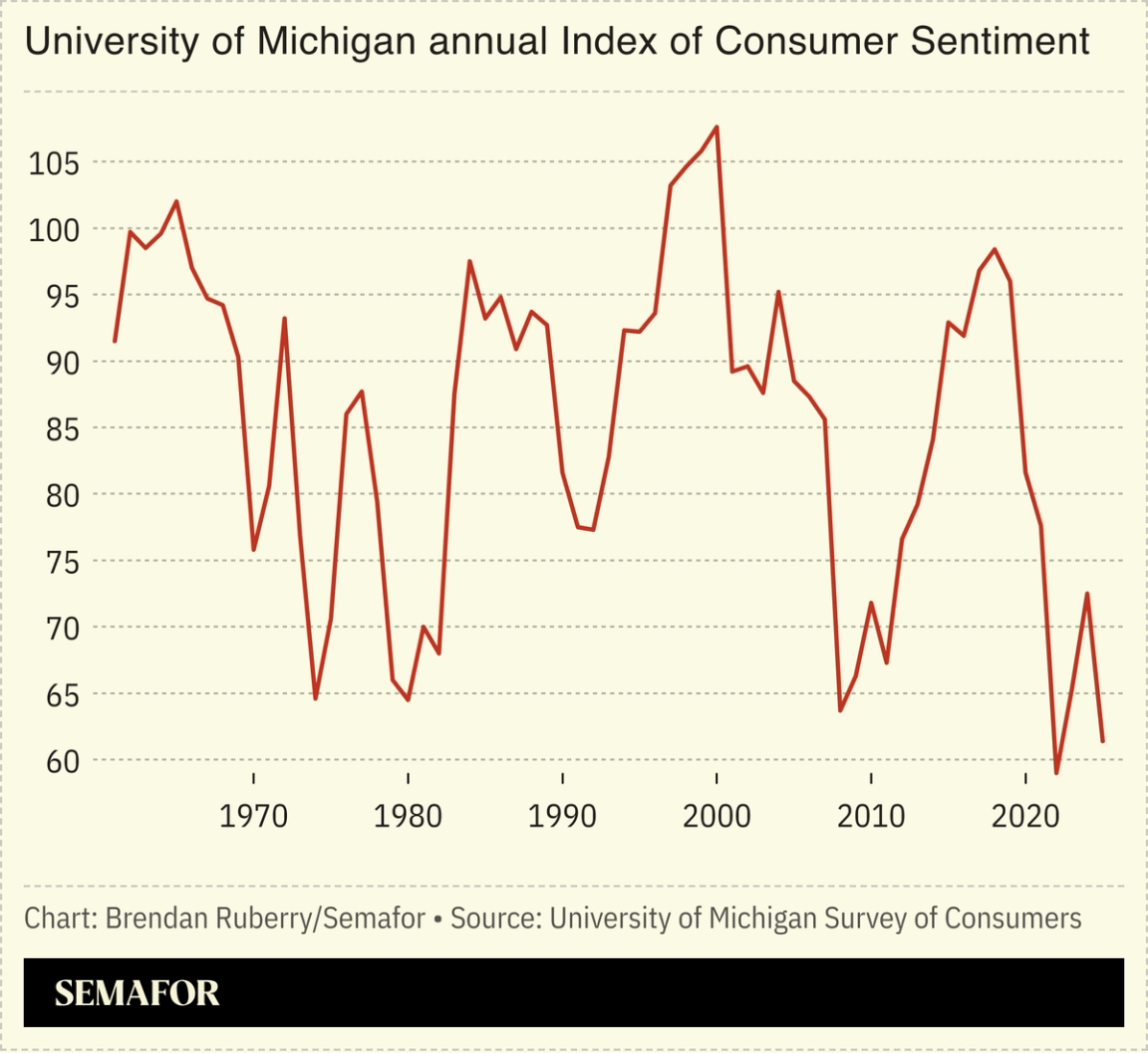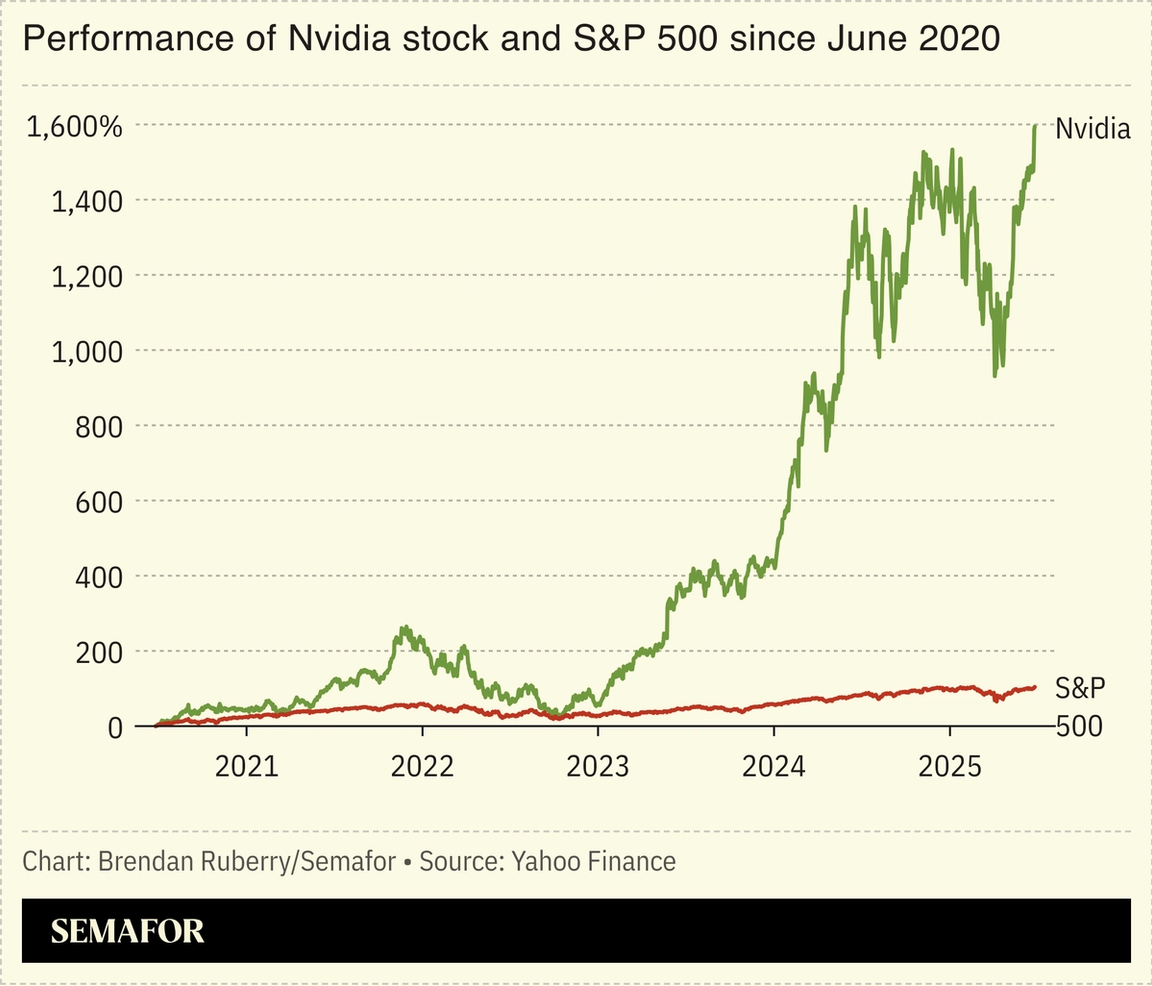| | Iran’s supreme leader declares “victory,” Nvidia shares keep soaring, and American and Italian socce͏ ͏ ͏ ͏ ͏ ͏ |
| |   KARNATAKA KARNATAKA |   TAIPEI CITY TAIPEI CITY |   CANBERRA CANBERRA |
 | Flagship |  |
| |
|
The World Today |  - Khamenei’s next moves
- Iran changes China’s calculus
- Leaders play nuclear roulette
- Global dealmaking falls
- Don’t overlook the vibes
- Sky-high AI valuations
- Reddit to stay human
- Australian social media ban
- Anna Wintour steps down
- US-Italy food row
 A new art exhibition explores the inner psyche. |
|
Khamenei declares ‘victory’ |
 Office of the Iranian Supreme Leader/WANA/Handout via Reuters Office of the Iranian Supreme Leader/WANA/Handout via ReutersIran’s Supreme Leader Ayatollah Ali Khamenei declared “victory” over Israel and said the US had been dealt a “severe slap,” in his first public statement since the ceasefire. Despite his rhetoric, Khamenei has been severely weakened from the short war, with Israel openly discussing the possibility of assassinating him, and US President Donald Trump musing about regime change. Khamenei is effectively leading a “zombie regime,” historian Arash Azizi said. “He’s now finished in some very real ways.” But he’s unlikely to fully capitulate to the US, and will instead seek “an equilibrium that can be summarized as ‘no war and no peace,’” an Iranian politics scholar wrote in The New York Times. “He wants neither confrontation nor normalization.” |
|
Iran strikes change China, NK calculus |
 The White House/Handout via Reuters The White House/Handout via ReutersThe US strikes on Iran are changing the geopolitical calculus of Washington’s adversaries in Asia, experts say. China is likely rethinking how US President Donald Trump might approach Beijing’s potential invasion of Taiwan, The New York Times reported. While China previously perceived Trump as more transactional and isolationist, “the view that he will flinch in a crisis has been debunked” after the Iran intervention, a US official told the Financial Times. “That has rebuilt some deterrence vis-à-vis China.” North Korea, by contrast, could be emboldened by Washington’s strikes on Tehran, as they prove to Kim Jong Un that his nuclear arsenal is critical to the regime’s survival, The Wall Street Journal wrote, since other countries’ nuclear ambitions have invited attacks. |
|
Moral breakdown risks nuclear war |
 An absence of competence and morality in global leadership is heightening the risk of nuclear catastrophe, two prominent analysts argued. Recent conflicts embroiling nuclear-armed nations have demonstrated how this period of geopolitical volatility is exacerbated by leaders’ lack of “cognitive, spiritual, and emotional capabilities” necessary to manage such high-stakes weapons, The Atlantic’s editor-in-chief Jeffrey Goldberg wrote. “Humans will need luck to survive this period,” he warned, as world powers play “nuclear roulette.” Indian academic Pratap Bhanu Mehta similarly chastised leaders for their “casualness about risk, a yearning for an easy Machismo, [and] an aesthetic videogaming of real war”: The global nuclear order is destabilizing and “there are no adults left in the room.” |
|
Global dealmaking falls to 20-year low |
 Will Burgess/Reuters Will Burgess/ReutersGlobal dealmaking fell to a two-decade low in the first half of 2025, new data showed, as firms grappled with uncertainty surrounding US President Donald Trump’s tariffs. Analysts initially believed Trump’s deregulatory and business-friendly stance would spur an M&A renaissance alongside lower inflation and interest rates — but deals were down 16% year-over-year, The Wall Street Journal reported. “Corporates were just in wait-and-see mode,” an expert said. Dealmakers have also found it challenging to assess a company’s worth as the levies make long-term projections difficult. Deals are still getting done, PwC analysts wrote this week, but they largely involve companies “with a local focus within national borders” and service industries less exposed to tariffs. |
|
The case for economic vibes |
 Investors and analysts should pay closer attention to data showing US consumers are souring on the economy, the head of a leading sentiment survey argued. While recent surveys suggest many Americans are feeling glum about prices, jobs, and businesses, such vibes-based signals — or “soft data” — have largely been dismissed in favor of hard economic data that shows unemployment and inflation aren’t catastrophic. But critics of soft data are “missing the point,” Joanne Hsu, director of the University of Michigan’s Surveys of Consumers, told Bloomberg. “It’s just really dangerous to overlook.” The survey is rarely wrong in spotting recessions, except in 2022 when sentiment tanked, though a slowdown never materialized. Now, economists question whether a similar fakeout is happening around tariffs. |
|
Skepticism over AI valuations |
 Chip giant Nvidia’s stock hit a record high Thursday, giving it a market capitalization of about $3.8 trillion, though analysts increasingly question whether the artificial intelligence sector is overvalued. The skepticism isn’t brand new — exactly a year ago, Goldman Sachs analysts warned the hype might be inflated — but the debate has resurfaced as Nvidia rebounded following a slump, and as new AI startups receive sky-high valuations. “It is still hard to see where the returns will come from to justify the huge capital spending,” a Financial Times editor argued. A venture started by a former OpenAI executive has reportedly raised $2 billion at a $10 billion valuation, despite little public strategy and no revenue. “Call it vibe valuing,” The Economist wrote. |
|
Reddit vows to stay ‘human’ |
 Dado Ruvic/Reuters Dado Ruvic/ReutersReddit wants to stay “distinctly human” to protect its communities — and income — from artificial intelligence-generated content, its CEO told the Financial Times. The 20-year-old self-proclaimed “front page of the internet” has a vast repository of user-made material: a treasure trove for AI training that has allowed it to strike multimillion-dollar deals with Google and OpenAI. But users suspect a rise in AI-generated responses, which would dilute Reddit’s value in training AI-powered search tools. CEO Steve Huffman said Reddit was in an “arms race” with AI-generated content: “It’s the place you go when you want to hear from people, their lived experiences, their perspectives.” Reddit’s drive to ensure human-curated content comes as recent studies warn AI is homogenizing our thoughts. |
|
Australia’s social media ban is on track |
 Asanka Brendon Ratnayake/Reuters Asanka Brendon Ratnayake/ReutersYouTube is sparring with Australia’s internet regulator over the country’s teen social media ban. Australia’s plan to fine social media firms for failing to block under-16 users — the world’s first such ban — is moving closer to being implemented after a trial to verify users’ ages was deemed successful. The test found that while there was no “single ubiquitous solution” to the problem of checking users’ ages, a combination of approaches — including facial recognition and biometric systems — was successful, despite raising privacy concerns, The Register reported. The country’s regulator has now urged the government to overturn YouTube’s exemption from the ban, adding uncertainty around the law that other countries are expected to emulate, Reuters wrote. |
|
Anna Wintour stepping down |
 Caitlin Ochs/Reuters Caitlin Ochs/ReutersAnna Wintour, arguably one of fashion’s most influential figures, is stepping down as editor-in-chief of American Vogue after 37 years. Wintour, who chairs the annual Met Gala and likely inspired Meryl Streep’s steely character in The Devil Wears Prada, has been synonymous with the iconic magazine that she began leading in 1988. She is widely credited for the now-standard practice of putting celebrities from outside fashion on magazine covers, and is heralded for setting style trends and identifying up-and-coming designers. Wintour will stay on as Condé Nast’s global chief content officer and Vogue’s global editorial director, but the shift is “the surest sign that the company is considering succession plans for the inevitable post-Wintour era,” Business of Fashion wrote. |
|
US, Italian athletes feud over food |
 Carlos Ba Carlos Ba |
|
|